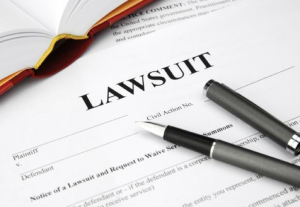Even if you feel you are an extremely careful person who attempts to play by the rules and treats people fairly, your personality is no indicator as to whether or not you will be sued. If you own assets, run a business, avoiding conflicts and treating people with respect are great rules to live by. Unfortunately, even these wonderful traits cannot keep hungry lawyers from mounting an attack on your resources. So, let’s talk about lawsuit prevention and what you might do to help stop a lawsuit before it starts.
A hungry pride of lions does not care who has been the nice antelope eating grass and minding its business. They are just looking for their next meal. The legal profession is just as heartless. Don’t be deceived by smooth talk, pinstriped suits, and wood paneled walls. Lawyers put food on their tables by taking it off of yours. Your depth of your kindness is irrelevant.
Self-Serving Lawmakers Stack the Deck Against You
Elected federal and state lawmakers come mainly from the legal profession. Most of them are lawyers. Think about it. Laws are merely written manifestations of human imagination. As such, most of the laws are written to slant the scale for the benefit of the legal profession. So, when you are sued, the deck already is stacked against you.
Laws Don’t Have to be Fair
They are written to make it as easy as possible for lawyers to take money out of your pocket and put it into theirs. To a great extent, the hands of the judges and juries are tied. Law schools take a figurative bullwhip to the minds and emotions of their students and lash out any notion of independent perception of right and wrong, good or evil. They slap their students onto a pre-constructed train track, a codified network of thought, off of which none must stray. The system is established such that members of the judiciary and those who argue cases before them must rigidly follow a system of written statutes to which they must adhere like a flurry pre-programmed robots.
This, or some version of this, may be the way it needs to be for our system to work. Like it or not, it is the way it is. So, we either run for elected office or influence those who do, or we accept it the way it is. In the midst of warfare, bombs and bullets flying overhead, it’s time to take cover and fight for what’s yours. Putting one’s hands on one’s figurative hips and exclaiming the unfairness of the defensive position we must take will not protect us from financial decapitation.
Fight Back With Preparation
It is time to arm yourself with knowledge. Once, armed it is time to take action to establish the legal tools needed to win to defend yourself and win the war.
No matter how you act, risks are all around you every day. If a business owner gets into a car accident and injures somebody, he or she, if not prepared, can wind up with life altering lawsuit. Preparation and protection from lawsuits are essential elements today, and these things can be accomplished by both educating oneself about the risks and taking the necessary steps to prevent a lawsuit from confiscating your assets.

Preventing Lawsuits
Since you have worked your entire life to accumulate your wealth and assets, you certainly want to know how to protect your assets. Then you’ll want to take steps to actually protect them. There are a few precautionary steps you can take to ward off lawsuits before they start.
Avoid Business Partnerships
Avoid getting involved in business partnerships. This arrangement creates at least triple the liability. When you are sued, the business can be taken. When your partner is sued the business can be taken. When the business is sued, the assets of the business and the owners can be taken. So, you will want to avoid business partnerships. With a corporation or LLC, at least if the business is sued, you may have a wall between business and personal assets. However, assets that are moved into a joint ownership position in a business partnership place you in a tremendously greater risk because it opens the door to everybody’s creditors coming after the assets placed into the partnership. Plus it does not provide a barrier when the business is sued.
Avoid Co-Signers
Thinking about putting another name onto your bank account? This idea is another action you should avoid to prevent lawsuits. Adding any co-signer onto your bank account opens up your finances to that other person’s creditors, and help possible lawsuits. While you may have the best intentions in mind when adding a family member to a bank account as a co-owner, this is not the most logical step to take to protect your assets from lawsuits. The more people on a bank account, the more creditors you allow to come into that account and withdraw funds.
If you wind up in the position of needing to have another individual sign a check for you or take out funds on a signature, you may need to seek out the advice of a legal specialist. However, there are other things you can do that are far more beneficial to you than putting your assets in jeopardy with a co-signer. There is something called Tenancy by the Entireties that can be used in a handful of states help shield assets from the creditors of one spouse. Other than this, there are many good reasons to avoid having a co-signatory on your personal bank account.
Don’t Co-Sign a Loan
If you co-sign on a loan, the path of least resistance is for the other person to get into financial trouble, leaving you on the hook for the loan. No matter how great the person is doing now, no matter how much you trust them, no matter how good you think their prospects, now matter how much you love them, have the discipline to see that the risk of damage is greater than the possible rewards…to either party. Many family relationships have been ruined when well-meaning relatives “trust” their family members who later run into financial trouble. Live by the motto, “If my kids can’t get the loan on their own then they can’t afford it.” It’s that simple. Don’t let your heart drag your money and your relationships down a dark hole. If the multi-billion dollar bank is saying they need a cosigner, that is the lender saying, “They can’t afford it on their own.” Take some advice from the multi-billion dollar institution. Just say “no.”

Living Trusts are Not for Asset Protection
They are for estate planning. Do not be fooled into thinking you have strong asset protection if you have decided to place your assets into a domestic, revocable living trust. These types of trusts are good for one thing, and that is typically avoiding the possibility of probate fees and possibly lowering estate taxes at your passing for those designated to inherit the trust assets. However, this type of trust does not do much to protect your assets from future creditors, so make sure you are wise in the way of trusts to ward off and prevent lawsuits. There are very powerful trusts designed specifically for asset protection. A living trust is generally not one of them.
Run Your Business as a Corporation or LLC
If you own business, make sure that you take the necessary steps to incorporate it or form a limited liability company (LLC). Sole proprietorships or partnerships lack protection when the business is sued, leaving the owner’s wide open to legal liability. Even if you own 100% of the company and are the only officer, director or manager, there are still provisions in place to protect you from the majority of business lawsuits. When you operate your business using one or more of these entities, make sure you do not use the corporate account to pay directly for personal expenditures and be sure to follow the necessary legal formalities to keep your legal shield strong.
Title Your Assets Properly
One important step to help ward off lawsuits, and one step many people forget to accomplish, is to review the titles to your assets. Make sure that after forming a trust, limited partnership, LLC or corporation in order to protect your assets, or receive the other benefits these tools provide, you need to change the titles to your property into the name of the entity. Having seat belts in your car do not make you safer unless you actually wear them, and wear them properly. Often, after people have established legal entities, they forget to change all of the titles to the assets. If you want to ward off legal predators using these tools, you’ll need to change the titles. Once you have established the proper tool under and have followed licensed advice, go to a title company or the county recorder’s office and file a deed that changes the ownership of each piece of real estate into land trusts or LLCs. Go to the DMV and change the title to cars into title holding trust, for example.
Set Up an Estate Plan
The two main expenditures when leaving an inheritance are probate fees and estate taxes. Any individual plans to leave an inheritance should have an estate plan. Your passing is hard enough for your surviving loved ones. Don’t leave them with a legal mess too.Setting up a living trust transfers assets to your heirs quickly and easily, without expensive probate fees and court costs. Simply put, probate is the legal process of moving assets from the deceased to the living. Without a trust, this can be a very expensive and time-consuming process. Even if someone has a will, probate fees are still imposed in those states that charge them. For example, New York’s probate fees can range from 2% to 7%, or more, of estate’s value. Attorney’s fees and executor’s fees range from 2.5% to 5%. Adding the two can pile on 12% if someone does not have assets in a trust. In most jurisdictions there are probate fees based on the gross value of the assets being transferred, regardless of encumbrance against these assets. That means if someone had a $1 million house with a $1 million mortgage (or no mortgage for that matter) the probate fees and costs could be as high as $120,000 or more. If the home was in an estate planning trust, those fees could be reduced to zero.Moreover, with a certain type of trust called an “A/B” trust, you may be able to double the amount given to your heirs on an estate tax-free basis. How does it usually work? Basically it transfers half the assets into the “A” trust that the surviving spouse has full access to. The other half are moved into the “B” trust that allows the surviving spouse to enjoy the income (but not the principal) generated in this trust. When both spouses die, the A and B portions are passed along to heirs as if two separate people granted them, thus doubling the amount of the exemption.

Annual Checkup
Every year, or better yet, every few months, review your asset protection plan to make sure that it is growing as your assets grow. Make sure it still dissuades creditors and lawyers from attacking your wealth. One way to do this is to review your asset protection plan for risks that you may have incurred over the past few months. After analyzing the risks, try to get rid of them, by establishing the proper legal too. Add a rental property? Set up a land trust and/or LLC. Buy a new car? Put it into a title holding trust. Start another business? Set up a new corporation or LLC to separate its potential liability from your personal assets as well as that of your other businesses.
Corporate Director? Think Again
When working for or with someone else’s corporation, do your best to avoid serving on the board of directors unless you have substantial insurance coverage protecting your backside. However, in most cases, there won’t be, and if you are thinking about being involved on a board, think long and hard. This is even with a nonprofit organization, even if you receive no pay. Placing yourself on a board of directors can make you a target for lawsuits directed at that particular corporation, and you want to make sure you are covered and that your assets are shielded from attacks. Sure there are laws in place to protect directors. However, lawyers aren’t shy about suing everyone within spitting distance, whether justified or not. If you don’t need to, why risk it?
Multiple Asset Protection Tools
Use multiple tools to protect multiple assets, not just one. While it may seem tempting to do so, be careful placing all of your assets into any one legal tool. An asset protection tends to work well for liquid assets. Land trusts combined with LLCs are popular for holding real estate. title holding trusts for each vehicle keep ownership private. Operate separate businesses in separate corporations and/or LLCs to cubbyhole the liability. Creating a series of lawsuit shields can help protect you from becoming a victim of the legal system. You need to make sure you have the right combination of legal tools for each asset. You need to divide and conquer, and associate each asset with the proper legal tools so that a legal bomb dropped in on container does not decimate your nest egg.
Environmental Issues
While buying real estate might feel elevating, you still need to take certain steps to ensure that new property does not expose you to lawsuits. One big consideration to make when considering a real estate purchase is to see if the land is contaminated by hazardous waste. If you take the title to such property in your name, you will likely wind up becoming personally liable. The EPA has a “shoot now, ask questions later” policy. Just ask anyone who has suffered at their hand. Therefore, before putting your name on that title, for any property, make sure the land is checked out be an expert in environmental waste. Ownership of this kind of property is not the only thing that can create a liability issue and expose you to legal problems—you will also may be responsible even if you are simply a trustee, executor, or partner associated with the title to the property.
Study But Act
Don’t get caught in the trap of “paralysis by analysis.” Figure out what you need to do, and then do it. You don’t need to know what every circuit board in your television before you turn it on. Just turn it on. Some people are always studying the roots. Other are eating the fruits. Find out what you need to do, then do it. Don’t get caught with your pants down while legal robber barons come in and take everything you own. Find out which legal tools you need, set them up, use them, and then go run your business.

Do Right.
“The best way to not get caught doing something wrong, is to not do something wrong.” Review and follow all legal protocols. Never think that you can work outside of legal boundaries, because that is exactly the type of action that will make you a lawsuit target. Obeying the law and honoring your contracts will make far less likely to be a lawsuit target.
Know the Statute of Limitations
Once you transfer assets into certain legal tools and leave them in there for a certain period of time, your opponent could not get them even if he or she wanted to. Though a last minute transfer into an asset protection plan may be better than doing nothing, don’t you think it is better to put your legal enemy in a position of being able to do nothing against you? If you put assets into a Cook Islands trust, for example, and they are in the trust for a year or two, a hungry plaintiff could not get the assets out of the trust even if he or she took the extraordinary step of hiring a lawyer in the Cook Islands. It would be too late. The courts would not even hear the case. With a Medicare trust, assets must be in the trust for at least five years before you need Medicare to pay for expenses. Pre-planning in this case could shave you hundreds of thousands of dollars in medical care. So, put assets into the right structures before you need them and you put yourself in the strongest position. There are options for last-minute protection if needed. But why not put the odds in our favor by acting early?
Transfer Assets to Your Kids
Though this strategy won’t work after you are sued or know a lawsuit is on the way, transferring assets to kids little by little may be a great strategy in asset protection and estate planning. But just like you don’t want to hold assets in your own name, you don’t want our kids to do so either. Plus, what if you need the money for yourself while you are living? The solution? Set up a family LLC. With a manager-managed LLC, you can retain the position of leadership. Have a “don’t get rid of Dad and Mom” clause written into the operating agreement, so that a 100% vote is needed to vote the parents out as controlling managers. This tool allows Mom and Dad to transfer membership in the LLC in bits and pieces each year (but not the assets held by the LLC) at a value of less than the annual gift tax exclusion. Because both are doing the transfers, the amount that can be transferred doubles.Want to dip into the account and spend all the money on yourself before you die? Go for it. Want to buy or sell assets held by the LLC? It’s your baby; do it. With the properly drafted operating agreement, you can remain in the driver’s seat with your assets locked in a legal fortress. Only keep things you are not concerned about losing a lawsuit. This concept is another potential step keep the legal target off of your back, and enjoy financial security long into your later years.
Related Articles



